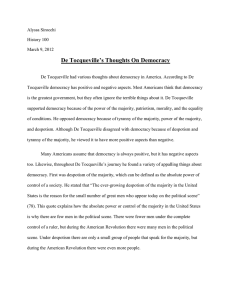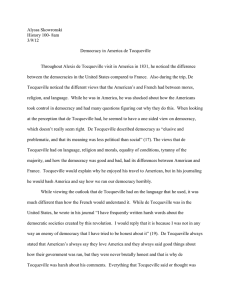Meanings of Civil Society
advertisement
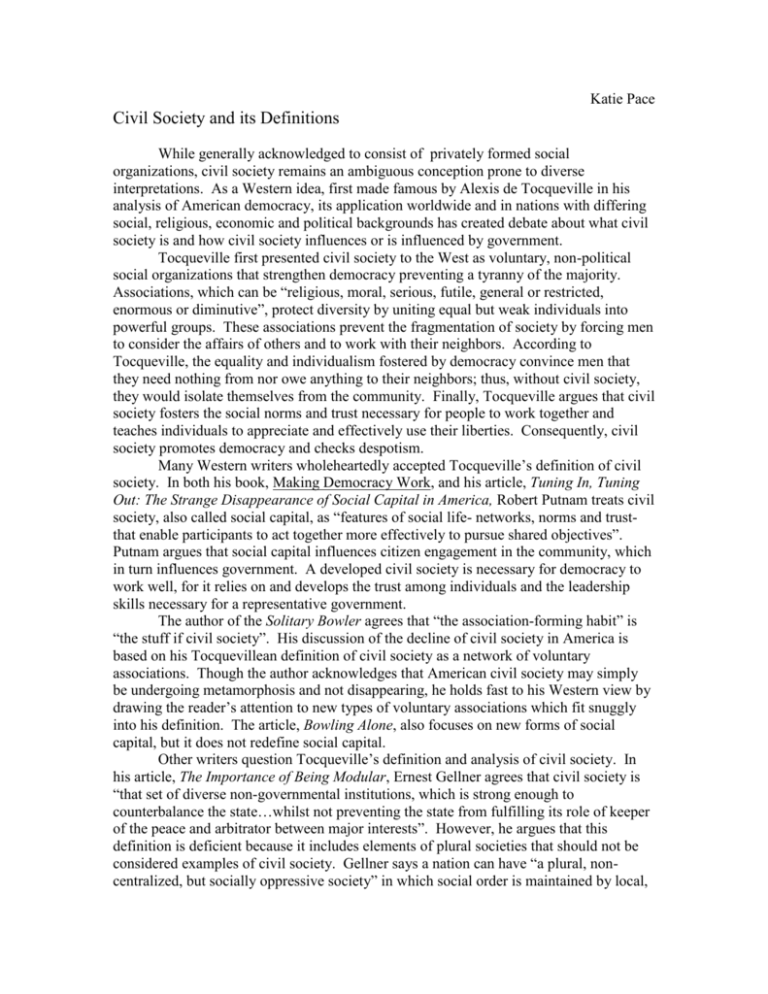
Katie Pace Civil Society and its Definitions While generally acknowledged to consist of privately formed social organizations, civil society remains an ambiguous conception prone to diverse interpretations. As a Western idea, first made famous by Alexis de Tocqueville in his analysis of American democracy, its application worldwide and in nations with differing social, religious, economic and political backgrounds has created debate about what civil society is and how civil society influences or is influenced by government. Tocqueville first presented civil society to the West as voluntary, non-political social organizations that strengthen democracy preventing a tyranny of the majority. Associations, which can be “religious, moral, serious, futile, general or restricted, enormous or diminutive”, protect diversity by uniting equal but weak individuals into powerful groups. These associations prevent the fragmentation of society by forcing men to consider the affairs of others and to work with their neighbors. According to Tocqueville, the equality and individualism fostered by democracy convince men that they need nothing from nor owe anything to their neighbors; thus, without civil society, they would isolate themselves from the community. Finally, Tocqueville argues that civil society fosters the social norms and trust necessary for people to work together and teaches individuals to appreciate and effectively use their liberties. Consequently, civil society promotes democracy and checks despotism. Many Western writers wholeheartedly accepted Tocqueville’s definition of civil society. In both his book, Making Democracy Work, and his article, Tuning In, Tuning Out: The Strange Disappearance of Social Capital in America, Robert Putnam treats civil society, also called social capital, as “features of social life- networks, norms and trustthat enable participants to act together more effectively to pursue shared objectives”. Putnam argues that social capital influences citizen engagement in the community, which in turn influences government. A developed civil society is necessary for democracy to work well, for it relies on and develops the trust among individuals and the leadership skills necessary for a representative government. The author of the Solitary Bowler agrees that “the association-forming habit” is “the stuff if civil society”. His discussion of the decline of civil society in America is based on his Tocquevillean definition of civil society as a network of voluntary associations. Though the author acknowledges that American civil society may simply be undergoing metamorphosis and not disappearing, he holds fast to his Western view by drawing the reader’s attention to new types of voluntary associations which fit snuggly into his definition. The article, Bowling Alone, also focuses on new forms of social capital, but it does not redefine social capital. Other writers question Tocqueville’s definition and analysis of civil society. In his article, The Importance of Being Modular, Ernest Gellner agrees that civil society is “that set of diverse non-governmental institutions, which is strong enough to counterbalance the state…whilst not preventing the state from fulfilling its role of keeper of the peace and arbitrator between major interests”. However, he argues that this definition is deficient because it includes elements of plural societies that should not be considered examples of civil society. Gellner says a nation can have “a plural, noncentralized, but socially oppressive society” in which social order is maintained by local, kin-defined, religious and stifling rituals that leave no room for individual autonomy. Therefore, civicness cannot be determined by pluralism. Once must narrow the definition of civil society and take a closer look at a society’s associations to see if they fall within the new definition. Sheri Berman attacks the traditional conception of civil society in, Civil Society and the Collapse of the Wiemar Republic. Prior to the nazi’s rise to power, Germany society was a plethora of social institutions. Due to the lack of responsive national government and political parties, these associations fragmented society instead of uniting it. Consequently, in an “inversion of neo-Tocquevillean theory”, civil society weakened and eventually destroyed the Weimar Republic, replacing a democracy with a totalitarian regime. Consequently, Berman argues that associations should be considered “a politically neutral multiplier, dependent for its effects on the wider political context”. Once the concept of civil society was applied to the East, more objections were thrown at it. In his article, Orientalism, Islam and Islamists, Bryan Turner discusses the role of relativism and ethnocentrism in western analysis of Middle Eastern society. Turner defines the Western viewpoint of civil society as “that network of institutions which lies between the state and individual and which simultaneously connects the individual to authority and protects the individual from total political control.” The West assumes that civil society is the main indication of social progress from a state of nature to one of civilization and from despotism to democracy. Defined by the West, despotism exists where “civil society is either absent or underdeveloped”. The western concept of civil society is based on in individualism; thus, the West assumes there is “no established tradition of legitimate opposition to arbitrary governments in Islam” because Islam is “devoid of individual rights and individuality”. However, the West ignores similarities between Islam, Christianity and Judaism. Furthermore, the West accepts Islam’s lack of social capital as the cause of its political instability and fails to examine other possibilities. Eva Bellin also questions the application of Tocqueville’s civil society to eastern studies in her work, Civil Society: Effective Tools of Analysis for Middle East Politics?. Bellin argues that the term itself has a range of definitions. The West has applied this ambiguous term to the Middle East and determined that the region is “inhospitable to civil society”. Yet, the West ignores the use of the term by Middle Easterners themselves. Leaders call on civil society to promote projects of modernization. Islamists employ the concept to gain influence in the public sphere. Intellectuals use the term to increase individual liberty. Thus, civil society acquires elements of “secularism, citizenship, civisme, civility, civil liberties”, most of which would destroy despotism. Bellin concludes from this that the West should not dismiss the existence of civil society in the Middle East. Samu Zubaida also urges proponents of civil society to reexamine its definition in his article, Islam, the State and Democracy. He defines two concepts of civil society. The first, a secular-liberal definition, conceives of civil society as voluntary associations that “foster individual autonomy and provide experience in the exercise of social and political rights and responsibilities”. For such associations to exist, the state must withdraw from economic and associational life while creating “legislation and institutional mechanisms which provide the framework of rights and obligations for these spheres”. The second definition of civil society is an Islamic-communal definition that conceives of civil society as an “informal network of relationships” whose focus is property and business. Finally, Ibn Khaldun provides a conception of civil society that, while written long before debates about social capital began, could enlighten the West about civil society in the East. In The Maquaddimah, Khaldun’s civil society is based on group feeling and religion. A leader acquires power and a society acquires stability if the community is bonded by feelings of kinship and common descent and by connections between clients and allies. Religion strengthens these bonds by eliminating jealousy and discord as the community focuses its energy on important goals. Group feeling can exist in harmony with an absolute ruler and its lack can destroy an empire, rendering a community vulnerable to outside control. The different approaches to civil society outlined above leave the reader with two opposing definitions of civil society. The first is a Tocquevillean definition in which civil society and democracy are assumed to complement each other. The second is a Middle Eastern definition in which civil society does not consist of formal groups whose existence is designed to achieve specific goals. Civil society is instead a series of informal relationships based on religious, familial and clientele connections that can and do exist under undemocratic governments, for they are entirely beyond the government’s sphere. These relationships have existed throughout Islamic history and continue to exist today.
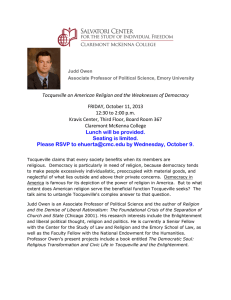
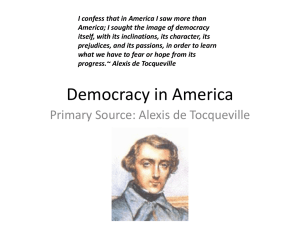
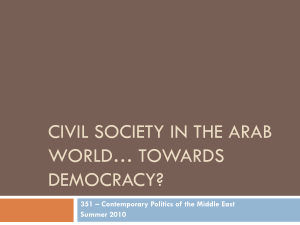
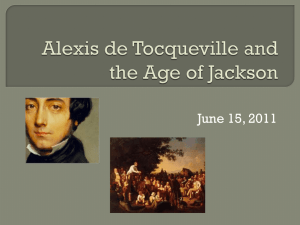
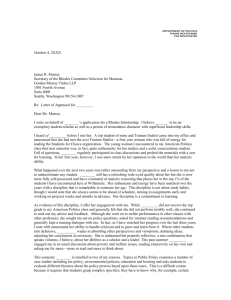




![“The Progress of invention is really a threat [to monarchy]. Whenever](http://s2.studylib.net/store/data/005328855_1-dcf2226918c1b7efad661cb19485529d-300x300.png)
